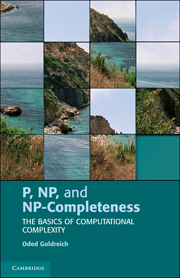Book contents
- Frontmatter
- Contents
- List of Figures
- Preface
- Overview
- To the Teacher
- Notations and Conventions
- Main Definitions and Results
- 1 Computational Tasks and Models
- 2 The P versus NP Question
- 3 Polynomial-time Reductions
- 4 NP-Completeness
- 5 Three Relatively Advanced Topics
- Historical Notes
- Epilogue: A Brief Overview of Complexity Theory
- Appendix Some Computational Problems
- Bibliography
- Index
To the Teacher
Published online by Cambridge University Press: 05 June 2012
- Frontmatter
- Contents
- List of Figures
- Preface
- Overview
- To the Teacher
- Notations and Conventions
- Main Definitions and Results
- 1 Computational Tasks and Models
- 2 The P versus NP Question
- 3 Polynomial-time Reductions
- 4 NP-Completeness
- 5 Three Relatively Advanced Topics
- Historical Notes
- Epilogue: A Brief Overview of Complexity Theory
- Appendix Some Computational Problems
- Bibliography
- Index
Summary
According to a common opinion, the most important aspect of a scientific work is the technical result that it achieves, whereas explanations and motivations are merely redundancy introduced for the sake of “error correction” and/or comfort. It is further believed that, as with a work of art, the interpretation of the work should be left to the reader.
The author strongly disagrees with the aforementioned opinions, and argues that there is a fundamental difference between art and science, and that this difference refers exactly to the meaning of a piece of work. Science is concerned with meaning (and not with form), and in its quest for truth and/or understanding, science follows philosophy (and not art). The author holds the opinion that the most important aspects of a scientific work are the intuitive question that it addresses, the reason that it addresses this question, the way it phrases the question, the approach that underlies its answer, and the ideas that are embedded in the answer. Following this view, it is important to communicate these aspects of the work.
The foregoing issues are even more acute when it comes to Complexity Theory, firstly because conceptual considerations seem to play an even more central role in Complexity Theory than in other scientific fields. Secondly (and even more importantly), Complexity Theory is extremely rich in conceptual content. Thus, communicating this content is of primary importance, and failing to do so misses the most important aspects of Complexity Theory.
- Type
- Chapter
- Information
- P, NP, and NP-CompletenessThe Basics of Computational Complexity, pp. xxi - xxivPublisher: Cambridge University PressPrint publication year: 2010



